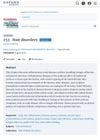A Perspective on Predictive Markers of Alopecia
January 2020
in “
Archives of Medicine and Health Sciences
”

TLDR Certain immune molecules and stress affect hair loss, and while genes play a role, more research is needed to fully understand and treat it.
In 2020, a review on predictive markers of alopecia, a hair loss condition, highlighted the role of cytokines such as Interferon-α (IFN-α), interleukin (IL), and tumor necrosis factor-α (TNF-α) in the development of Alopecia areata (AA), an autoimmune disorder affecting nearly 2% of the population. The review also discussed the impact of stress on the immune response and hair growth, citing a study of 33 female medical students. Additionally, a study of 52,000 males identified 250 genetic loci linked to severe hair loss. The potential of erythroid differentiation regulator 1 (ErDr 1) as a predictive biomarker for alopecia was also discussed. The review concluded that while genetic and environmental factors are significant in hair loss, further research is needed to understand the molecular mechanisms and develop new drug targets.




